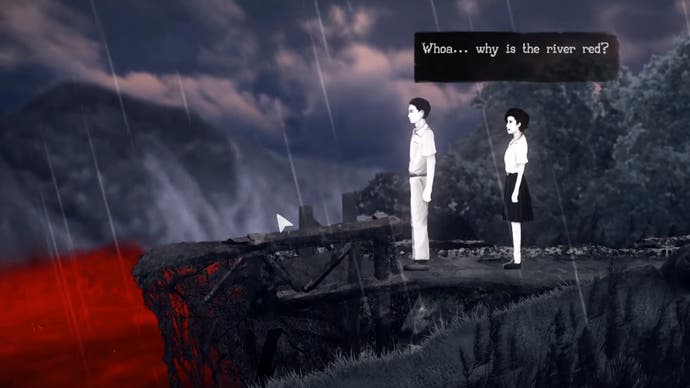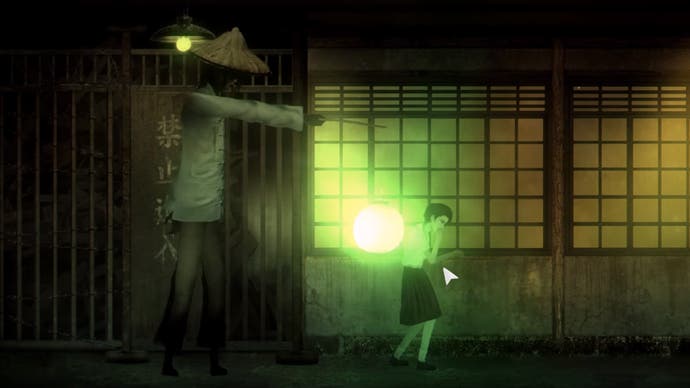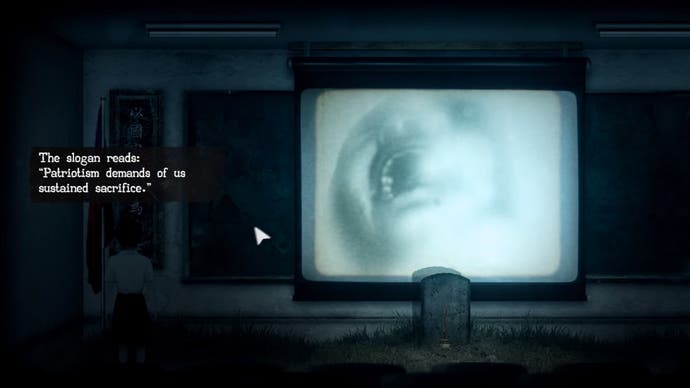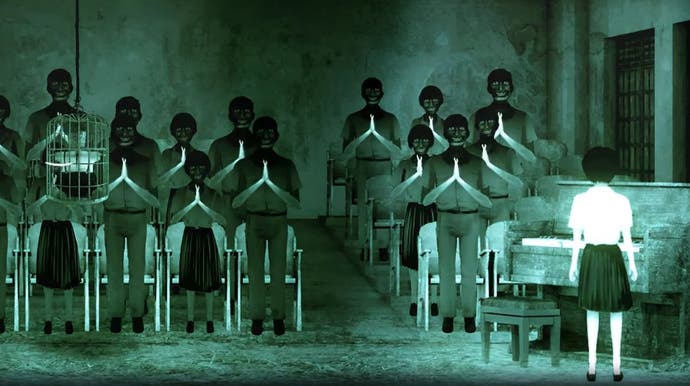Hungry ghosts and book burning: Detention explores Taiwan's dark past
Just hold your breath and walk away.
"If you chance upon a lantern spirit, avert your gaze and stand unmoving," warns an illustrated page from a creepy book you find in the horror adventure Detention. The accompanying print depicts a grey spectre with a wide-brimmed hat, arched over a toddler. He has covered his mouth with his hands, and his eyes are wide with fear. "When it comes near you, still your breath," the book continues. "Do not panic, and it will keep on moving."
You encounter a lantern spirit moments later. It stops dead still when it sees you, and peers down from stilt-like legs. If you keep your breath held, it continues its grim passage through the darkness - its hanging lamp swaying gently in the wind. Meanwhile, a literal blood river courses past the dimly-lit abandoned school you're trapped in. The walls sometimes pulse with plentiful squinting eyes. Even the laundry is haunted. If you idle too long underneath a washing line, unseen nasties snatch you upward.
Detention can be surreal too. At one point you stroll past a goldfish moon, surrounded by trees stuck with pins and figures made of static. Later, books burn in a windy field. Bound and hooded figures kneel in the bowels of an abandoned school - ankle deep in dark water. The latter set of scenes are all based on real-life historical events.
Detention takes place in 1960s Taiwan, more than a decade into the 38-year period of martial law known in as the White Terror. This was a period which plunged the country into an oppressive Orwellian nightmare that lasted nearly four decades. Around 140,000 Taiwanese citizens were imprisoned, and up to 4,000 executed for their real or perceived dissidence toward the ruling Nationalist Party of China government during the period.

The White Terror was only recently usurped by Syria as the longest period of martial law in history. Despite ending in 1987, the events of the period are yet to be common knowledge for the global community - and Taiwan's younger generations.
In Detention, you play as two teenagers sitting out a typhoon in a local school. The player moves through a candlelit diorama of folded-up flags propped aside glowing kerosene heaters. Sickly mustard walls and red shrines veiled with incense abound. In the distance, unknowable horrors with red tongues and long limbs lurk. Further back, garbled guqin tones soar out of a radio, fading into marching music. Detention is Asian folklore meets politics, with all the trappings of a ghost story.
"Don't be scared when you see the Lingered, just hold your breath and walk away," reads an illustrated warning from another book you find. You see these creatures jerking along throughout the levels. Sometimes they yowl like wounded animals. If you leave a bowl of rice for one near a shrine, it will kneel over the offering and chomp away.

Snacks and spectres are a common theme in Chinese mythology. During the Ghost Month, held across Asia in the seventh month of the lunar cycle (August this year), the gates of hell are said to open, unleashing starving hordes of spirits that wander the earth for 30 days and 30 nights.
It is believed to be the only time that Hungry Ghosts - tormented spirits with long, thin necks and huge distended bellies - can eat. Therefore, food offerings and special "ghost money" (bureaucracy abounds in the Chinese underworld) are left on the streets to appease them.
The Lingered from Detention are also derived from the vengeful spirit (or revenant) myth that permeates international urban legends and Asian horror movies. One is created when someone dies a cruel, unjust or unnatural death. Their ghost remains in an endless loop of suffering until their soul is freed or the grudge settled.
Plenty of doomed wanderers, often tied to the site of their death, like this exist in Chinese folklores. One type, the diao si gui, has a long red tongue and haunts the location where it died. It particularly likes trying to convince passers-by to join it in the afterlife.
In addition, Chinese mystical lore seeps into every aspect of Detention. In one section you lay your woes at the feet of an invisible god. Another time you come across bloodied I Ching counters. Traditionally the I Ching symbolises processes of change (and therefore the universe) in accordance with an ancient divination manual. You also stumble upon some prophetic Moon Blocks, which reveal Yang po, the "laughing answer" to you when shaken.

But Detention also has more unflinching themes to explore. An unmarked grave in a grassy mound lies in the centre of a long abandoned classroom. A projector screen face flickers with eyes closed and teeth bared. Another time, you pick up a diagnostic report at the health centre which reveals mysterious and terrible student injuries that are the result of an interrogation. There are mentions of the school auditorium being changed into a "testing" centre, and talk of banned books. Meanwhile, an unpleasant atmosphere of mutual surveillance permeates most communication in-game.
There are hints at what created this desaturated world: a copper statue of the president, which can be seen from anywhere in the school, a teacher who is reputed to be a "relentless war killer" - expecting the "commies" to turn up at any moment, bookshelves filled with stories of military, leadership, and war, and formal notices extolling the virtues of Patriotism pinned up on walls.
Feverish visions of vans on concrete, and tied-up kneeling figures pervade. Although its frights run deeper than most thematically, the story's overall message is left for the player to decide. Regardless, Detention is both a deep-dive into Taiwan's troubled past, a siren-song to its unique cultural history, and one hell of a creepy game.
It's not the first game to wrestle with a country's turbulent history. Interactive adventure 1979: Black Friday explores the journey of a young photojournalist amid the bloody Iranian Revolution. Its take on events delves into both the excitement and bleak complications of a long-awaited uprising.
On the folklore level, creepy Swedish vision-quest Year Walk gives pride of place to ancient myths native to the region, ranging from the sultry Brook Horse to the fatal Night Raven. All these titles prove that games can travel culture barriers, lending a voice to stories untold, forgotten or oppressed.
Art has proven an effective means of remembering tragedy in both the individual and national identity. "Believe that we are all born free," a shadow says to you toward the end of Detention, "eager to walk on your own path." Like many ghost stories world-wide, this game is more an exorcism than resurrection of phantoms past, the White Terror no longer a tragedy condemned to linger forgotten like a long-tongued wraith.

